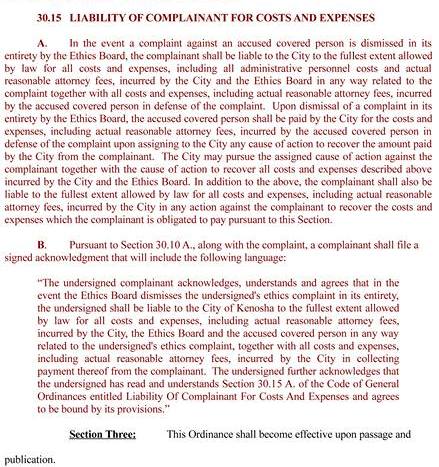The year 2013 might be remembered as the Year of the Ethics Violations in Racine Wisconsin. The year started with a series of complaints filed by The Racine Equality Project, and concerns about the outsourcing of Cable Access Racine soon followed.
Dan Macemon, a local business owner filed a complaint after a bid for a demolition project in the Uptown area resulted in damage to an adjacent building. Macemon alleges that the damage was caused by the City’s lax administration of bidding documents and an unfair bidding process.
Those interested in the Cable Access Racine matter, paid close attention to the details of the case. The filing of a complaint by Dr. Ken Yorgan of the Racine Equality Project, alleged that there were multiple ethics violations by the City of Racine, Mayor John Dickert, City staff, and even a member of the City of Racine Cable Commission. http://racineequalityproject.org/
Attendees of the first hearing were shocked to learn that two members of the mayoral appointed Ethics Board also worked on the Mayor’s election campaign  Lincoln Murphy and Doug Nicholson were each featured in literature and advertising for the Dickert campaign.
Lincoln Murphy and Doug Nicholson were each featured in literature and advertising for the Dickert campaign.

Another mayoral appointee, Russell Missureli, fell asleep during procedural phase
but opted to vote anyway.

Many were shocked that these three members did not recuse themselves either for at least an apparent conflict of interest or, in the case of Missureli, a lack of information.
At the time, Dr. Yorgan, the Chairman of the Racine Unity Project, was satisfied by Murphy and Nicholson and felt that they could be trusted to act in an ethical manner. The next ethics hearing was held and in less then 2 hours, all charges were dismissed.
Attendee Kate Remington was one of many who heard Chair Mary Wyant express the sentiment that ‘they (Ethics Commission) was not interested in the truth.’
Still, others were left with the impression that the charges were never really meant to be answered and that the hearing was just for show.
Macemon’s hearing would be even shorter. Conveniently there was no court reporter on hand to transcribe the hearings
Since that time, another issue has arisen. The recent Indian Burial Mound sale could still lead to more ethics hearings as changes are in the works to address the way in which ethics charges are handled.
“Cities Pitch Ethics Switch: Racine residents Could Have Kenosha Consider Ethics Complaints” Racine Journal Times 7-22-13
The solution may involve a change of venue for perceived ethics violations. By partnering with the City of Kenosha, Racine’s cases would be transferred to that jurisdiction’s ethics board, eliminating some of the conflicts, both perceived and real. Kenosha’s cases would similarly be transferred to Racine. Of course, both cities would need to have reciprocity in their rules.
Should the City of Racine follow Kenosha’s lead, one would have to live in Racine or the physical address of a business would have to be in Racine to file. According to various sources, Alderman Gregg Helding does not oppose the concept.
The City of Kenosha is also looking into making changes in their Ordinance

/
That change would mandate that should a charge be filed, and no violations are found to exist, the complainant would be charged a fine. Many believe that this would prevent thwart justice and will only serve stifle the complaints of those who are unable to take the financial risk, especially in light of the Board’s recent actions.
That change has not yet passed in Kenosha, though it is not expected come up against much resistance. If so, it’s possible that the City of Racine will do the same.
Dr. Ken Yorgan weighed in on the matter:
The ethics board in Racine is nothing more than a place where ethics complaints are taken to die a brief and anonymous death. As Chairman of the Racine Equality Project, I have had occasion to file two ethics complaints against members of the city administration on behalf of aggrieved citizens. I did not take that responsibility lightly and only signed my name as complainant after being thoroughly convinced that there actually were violations, and not simply someone’s disgruntlement with administrative procedures.
The proposed cooperative agreement between Racine and Kenosha, which would have these cities receive and review each others ethics complaints, is of questionable merit. This is especially true when a part of the agreement provides for harsh financial consequences against any citizen whose complaint is determined to be “unfounded.” While the threat of such consequences might act as a deterrent to someone whose only interest is badgering elected officials, it would also deter those who have legitimate complaints but lack confidence in the integrity of the process. It’s a classic case of a solution looking for a problem, specifically, how many complaints are filed in a given year, and how many can unequivocally be described as “unfounded?”
It is doubtful that a city has the authority to impose costs on anyone for filing an ethics complaint, regardless of the outcome, but it is troubling that such punitive prerogative be placed in the hands of political appointees. A better alternative would be to establish a process whereby disinterested citizens are called upon to review ethics complaints, in much the same way that juries are selected for judicial trials.
Dr. Ken Yorgan
Chairman, Racine Equality Project
This is posted or will be soon in the Paper I write for, in about a week I check the numbers for views. Yes the Story of Racine is getting out more and more




